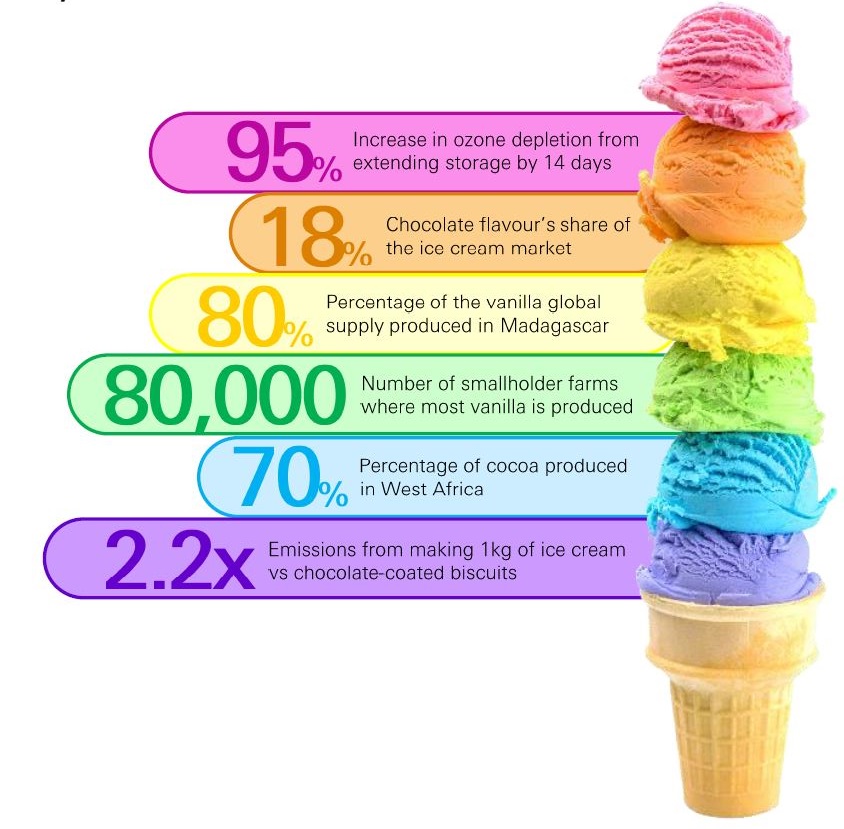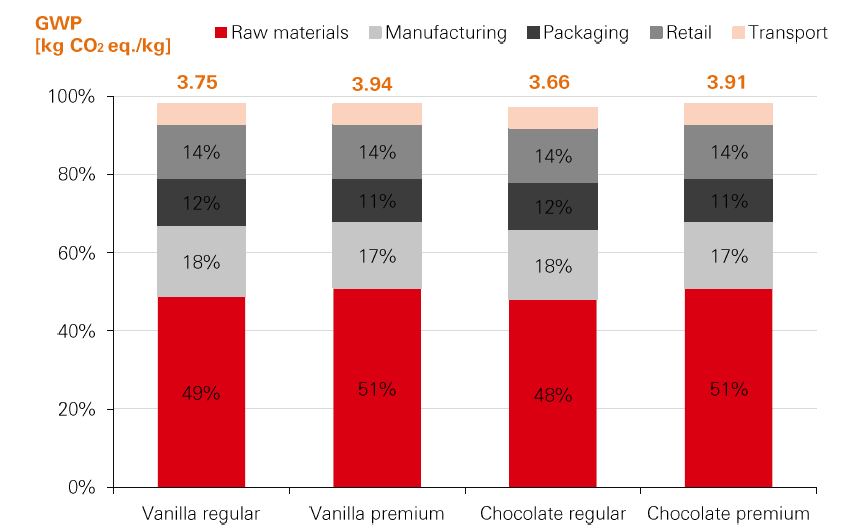
4 Aug 2023
Ice cream is an increasingly popular treat around the world, but investors should be aware of sustainability issues ranging from climate change to labour conditions. While investors should take into account how ice cream is sourced, produced and sold, they should also consider that it doesn’t (and might not) last forever.
In this issue of #WhyESGMatters, we look at the key contributors towards ice cream’s environmental impact (raw materials, manufacturing and retail and packaging), and social issues associated with popular flavours (vanilla and chocolate) and marketing. We also consider how the ice cream sector is impacted by climate change.

Scooping it up
The ice cream industry is growing globally. According to Fortune Business Insights, ice cream market revenue could grow from cUSD74bn (2022) to USD105bn by 2029. Key drivers of this growth include rising demand for innovative flavours and increased consumption, especially in developing markets[@grand-view-research-ice-cream-market-size-industry-report-2022-2030]. We believe that this increased consumption could lead to greater stakeholder focus on sustainability aspects.
Before it melts
Ice cream has a significant climate impact, arguably higher than many other reats. For example, the emissions from producing 1kg of premium vanilla ice cream is 3.94 kg CO2 (see Figure 1), which is 1.8x the climate impact of producing the same quantity of cupcakes and 2.2x that of chocolate-coated biscuits[@a-konstantas].We believe this could lead to more scrutiny of retailers’ commitments to reducing the climate impact of ice cream, while also considering the social aspects of ice cream production.
Figure 1: Climate impact of ice cream

Dairy farming and the cultivation of other raw materials used for making ice cream are associated with a number of environmental impacts.
Impacts of milk:
Impacts of other raw materials (e.g. cocoa, vanilla):
Vanilla: While some mass-market producers now use artificial vanilla flavourings, real vanilla remains an ingredient in some ice creams, particularly high-end products. It’s the second-most expensive spice in the world (after saffron) due to its sophisticated and labour-consuming production process. The orchid that produces vanilla beans is pollinated by wild Melipona bees. Since there’re not many of these bees in other top vanilla-producing countries, each flower must be pollinated by hand[@danwatch-every-single-vanilla-orchid-must-be-pollinated-by-han].
Cocoa: According to the World Cocoa Foundation, c70% of cocoa is produced in West Africa, mostly Ghana and Côte d’Ivoire. Small- scale farmers are the beginning of complex, fragmented supply chains that often include harsh conditions. Limited access to water, sanitation, health and education services mean that many producers are below the poverty line.
Mislabelling and deceptive marketing: Due to growing competition, rising cost of ingredients and pressure to deliver differentiated products, numerous instances of mislabelling and misselling of ice cream have been reported across different geographies.
Manufacturing: The impacts are mostly attributable to energy consumption, particularly during the hardening process and deep freezing. Considering annual consumption of ice cream in the UK, the total primary energy demand contributes to 3.8% of energy consumption in the whole food sector. In our view, there’s an opportunity to reduce the energy intensity of the manufacturing stage by optimising energy use and increasing the use of low-carbon energy sources.
Packaging: Stakeholder attention to reducing the impacts of packaging, e.g. fossil fuel depletion, energy demand and waste management, is likely to increase. Polypropylene tubs, which are the most widely used packaging material for manufactured ice cream, are a notable hotspot for these impacts. Some brands are planning to introduce or have already introduced ice cream packaging made from a monolayer wrapper, paper-based materials, or fully biodegradable materials. We believe these moves will help reduce the percentage of plastic packaging ending up in landfills.
We believe that investors should also consider how the ice cream sector is impacted by climate change and how companies respond to these challenges. For example, rising temperatures can affect cow milk productivity; in hot climate conditions, cows tend to eat less, and this reduces the amount of milk they produce. Water shortages due to climate change are another significant challenge as dairy products are the third-largest food product category in terms of water footprint[@philip-shine-et-al-a-global-review-of-monitoring-modeling-and].
As global warming impacts production of ice cream ingredients, leading ice cream companies are taking measures to mitigate these risks. For example, according to the International Union for the Conservation of Nature, vanilla crops are facing the highest risk of extinction due to rising temperatures exacerbated by climate change.
Similarly, global cocoa production is threatened by climate change, as according to the International Centre for Tropical Agriculture, rising temperatures in the tropical equatorial countries may significantly impact the suitability of the main-producing countries for cocoa production over the coming years. To mitigate these risks, leading cocoa processing companies are diversifying their supply sources and developing sustainable agricultural practices.
Investors should continue to scrutinise companies’ commitments in the ice cream industry, in our view; with future improvements focusing on the raw materials stage, especially raw milk production, as well as vanilla and cocoa cultivation. Other areas of potential investor attention include energy reduction during the refrigeration stage, plugging refrigerant leaks, correct labelling of ingredients, honest marketing practices and social impacts on workers in supply chains. With investor input, we can help make ice cream more sustainably delicious over time.




1. This report is dated as at 6 July 2023 .
2. All market data included in this report are dated as at close 5 July 2023 , unless a different date and/or a specific time of day is indicated in the report.
3. HSBC has procedures in place to identify and manage any potential conflicts of interest that arise in connection with its Research business. HSBC’s analysts and its other staff who are involved in the preparation and dissemination of Research operate and have a management reporting line independent of HSBC’s Investment Banking business. Information Barrier procedures are in place between the Investment Banking, Principal Trading, and Research businesses to ensure that any confidential and/or price sensitive information is handled in an appropriate manner.
4. You are not permitted to use, for reference, any data in this document for the purpose of (i) determining the interest payable, or other sums due, under loan agreements or under other financial contracts or instruments, (ii) determining the price at which a financial instrument may be bought or sold or traded or redeemed, or the value of a financial instrument, and/or (iii) measuring the performance of a financial instrument.
This document or video is prepared by The Hongkong and Shanghai Banking Corporation Limited (‘HBAP’), 1 Queen’s Road Central, Hong Kong. HBAP is incorporated in Hong Kong and is part of the HSBC Group. This document or video is distributed and/or made available by HSBC Bank Canada (including one or more of its subsidiaries HSBC Investment Funds (Canada) Inc. (“HIFC”), HSBC Private Investment Counsel (Canada) Inc. (“HPIC”) and HSBC InvestDirect division of HSBC Securities (Canada) Inc. (“HIDC”)), HSBC Bank (China) Company Limited, HSBC Continental Europe, HBAP, HSBC Bank (Singapore) Limited, HSBC Bank Middle East Limited (UAE), HSBC UK Bank Plc, HSBC Bank Malaysia Berhad (198401015221 (127776-V))/HSBC Amanah Malaysia Berhad (20080100642 1 (807705-X)), HSBC Bank (Taiwan) Limited, HSBC Bank plc, Jersey Branch, HSBC Bank plc, Guernsey Branch, HSBC Bank plc in the Isle of Man, HSBC Continental Europe, Greece, The Hongkong and Shanghai Banking Corporation Limited, India (HSBC India), HSBC Bank (Vietnam) Limited, PT Bank HSBC Indonesia (HBID), HSBC Bank (Uruguay) S.A. (HSBC Uruguay is authorised and oversought by Banco Central del Uruguay), HBAP Sri Lanka Branch, The Hongkong and Shanghai Banking Corporation Limited – Philippine Branch, and HSBC FinTech Services (Shanghai) Company Limited (collectively, the “Distributors”) to their respective clients. This document or video is for general circulation and information purposes only.
The contents of this document or video may not be reproduced or further distributed to any person or entity, whether in whole or in part, for any purpose. This document or video must not be distributed in any jurisdiction where its distribution is unlawful. All non-authorised reproduction or use of this document or video will be the responsibility of the user and may lead to legal proceedings. The material contained in this document or video is for general information purposes only and does not constitute investment research or advice or a recommendation to buy or sell investments. Some of the statements contained in this document or video may be considered forward looking statements which provide current expectations or forecasts of future events. Such forward looking statements are not guarantees of future performance or events and involve risks and uncertainties. Actual results may differ materially from those described in such forward-looking statements as a result of various factors. HBAP and the Distributors do not undertake any obligation to update the forward-looking statements contained herein, or to update the reasons why actual results could differ from those projected in the forward-looking statements. This document or video has no contractual value and is not by any means intended as a solicitation, nor a recommendation for the purchase or sale of any financial instrument in any jurisdiction in which such an offer is not lawful. The views and opinions expressed are based on the HSBC Global Investment Committee at the time of preparation, and are subject to change at any time. These views may not necessarily indicate HSBC Asset Management‘s current portfolios’ composition. Individual portfolios managed by HSBC Asset Management primarily reflect individual clients’ objectives, risk preferences, time horizon, and market liquidity.
The value of investments and the income from them can go down as well as up and investors may not get back the amount originally invested. Past performance contained in this document or video is not a reliable indicator of future performance whilst any forecasts, projections and simulations contained herein should not be relied upon as an indication of future results. Where overseas investments are held the rate of currency exchange may cause the value of such investments to go down as well as up. Investments in emerging markets are by their nature higher risk and potentially more volatile than those inherent in some established markets. Economies in emerging markets generally are heavily dependent upon international trade and, accordingly, have been and may continue to be affected adversely by trade barriers, exchange controls, managed adjustments in relative currency values and other protectionist measures imposed or negotiated by the countries with which they trade. These economies also have been and may continue to be affected adversely by economic conditions in the countries in which they trade. Investments are subject to market risks, read all investment related documents carefully.
This document or video provides a high level overview of the recent economic environment and has been prepared for information purposes only. The views presented are those of HBAP and are based on HBAP’s global views and may not necessarily align with the Distributors’ local views. It has not been prepared in accordance with legal requirements designed to promote the independence of investment research and is not subject to any prohibition on dealing ahead of its dissemination. It is not intended to provide and should not be relied on for accounting, legal or tax advice. Before you make any investment decision, you may wish to consult an independent financial adviser. In the event that you choose not to seek advice from a financial adviser, you should carefully consider whether the investment product is suitable for you. You are advised to obtain appropriate professional advice where necessary.
The accuracy and/or completeness of any third party information obtained from sources which we believe to be reliable might have not been independently verified, hence Customer must seek from several sources prior to making investment decision.
Important Information about HSBC Global Asset Management (Canada) Limited (“AMCA”)
HSBC Asset Management is a group of companies, including AMCA, that are engaged in investment advisory and fund management activities, which are ultimately owned by HSBC Holdings plc. AMCA is a wholly owned subsidiary of, but separate entity from, HSBC Bank Canada.
Important Information about HSBC Investment Funds (Canada) Inc. (“HIFC”)
HIFC is the principal distributor of the HSBC Mutual Funds and offers the HSBC Mutual Funds and/or the HSBC Pooled Funds through the HSBC World Selection® Portfolio service. HIFC is a subsidiary of AMCA, and indirect subsidiary of HSBC Bank Canada, and provides its products and services in all provinces of Canada except Prince Edward Island. Mutual fund investments are subject to risks. Please read the Fund Facts before investing.
®World Selection is a registered trademark of HSBC Group Management Services Limited.
Important Information about HSBC Private Investment Counsel (Canada) Inc. (“HPIC”)
HPIC is a direct subsidiary of HSBC Bank Canada and provides services in all provinces of Canada except Prince Edward Island. The Private Investment Counsel service is a discretionary portfolio management service offered by HPIC. Under this discretionary service, assets of participating clients will be invested by HPIC or its delegated portfolio manager, AMCA, in securities, including but not limited to, stocks, bonds, mutual funds, pooled funds and derivatives. The value of an investment in or purchased as part of the Private Investment Counsel service may change frequently and past performance may not be repeated.
Important Information about HSBC InvestDirect (“HIDC”)
HIDC is a division of HSBC Securities (Canada) Inc., a direct subsidiary of, but separate entity from, HSBC Bank Canada. HIDC is an order execution only service. HIDC will not conduct suitability assessments of client account holdings or of the orders submitted by clients or from anyone authorized to trade on the client’s behalf. Clients have the sole responsibility for their investment decisions and securities transactions.
Important Information about the Hongkong and Shanghai Banking Corporation Limited, India (“HSBC India”)
HSBC India is a branch of The Hongkong and Shanghai Banking Corporation Limited. HSBC India is a distributor of mutual funds and referrer of investment products from third party entities registered and regulated in India. HSBC India does not distribute investment products to those persons who are either the citizens or residents of United States of America (USA), Canada, Australia or New Zealand or any other jurisdiction where such distribution would be contrary to law or regulation.
The following statement is only applicable to HSBC Bank (Taiwan) Limited with regard to how the publication is distributed to its customers: HSBC Bank (Taiwan) Limited (“the Bank”) shall fulfill the fiduciary duty act as a reasonable person once in exercising offering/conducting ordinary care in offering trust services/ business. However, the Bank disclaims any guarantee on the management or operation performance of the trust business.
The following statement is only applicable to PT Bank HSBC Indonesia (“HBID”): PT Bank HSBC Indonesia (“HBID”) is licensed and supervised by Indonesia Financial Services Authority (“OJK”). Customer must understand that historical performance does not guarantee future performance. Investment product that are offered in HBID is third party products, HBID is a selling agent for third party product such as Mutual Fund and Bonds. HBID and HSBC Group (HSBC Holdings Plc and its subsidiaries and associates company or any of its branches) does not guarantee the underlying investment, principal or return on customer investment. Investment in Mutual Funds and Bonds is not covered by the deposit insurance program of the Indonesian Deposit Insurance Corporation (LPS).
THE CONTENTS OF THIS DOCUMENT OR VIDEO HAVE NOT BEEN REVIEWED BY ANY REGULATORY AUTHORITY IN HONG KONG OR ANY OTHER JURISDICTION.
YOU ARE ADVISED TO EXERCISE CAUTION IN RELATION TO THE INVESTMENT AND THIS DOCUMENT OR VIDEO. IF YOU ARE IN DOUBT ABOUT ANY OF THE CONTENTS OF THIS DOCUMENT OR VIDEO, YOU SHOULD OBTAIN INDEPENDENT PROFESSIONAL ADVICE.
© Copyright 2023. The Hongkong and Shanghai Banking Corporation Limited, ALL RIGHTS RESERVED.
No part of this document or video may be reproduced, stored in a retrieval system, or transmitted, on any form or by any means, electronic, mechanical, photocopying, recording or otherwise, without the prior written permission of The Hongkong and Shanghai Banking Corporation Limited.
Important information on sustainable investing
“Sustainable investments” include investment approaches or instruments which consider environmental, social, governance and/or other sustainability factors (collectively, “sustainability”) to varying degrees. Certain instruments we include within this category may be in the process of changing to deliver sustainability outcomes.
There is no guarantee that sustainable investments will produce returns similar to those which don’t consider these factors. Sustainable investments may diverge from traditional market benchmarks.
In addition, there is no standard definition of, or measurement criteria for sustainable investments, or the impact of sustainable investments (“sustainability impact”). Sustainable investment and sustainability impact measurement criteria are (a) highly subjective and (b) may vary significantly across and within sectors.
HSBC may rely on measurement criteria devised and/or reported by third party providers or issuers. HSBC does not always conduct its own specific due diligence in relation to measurement criteria. There is no guarantee: (a) that the nature of the sustainability impact or measurement criteria of an investment will be aligned with any particular investor’s sustainability goals; or (b) that the stated level or target level of sustainability impact will be achieved.
Sustainable investing is an evolving area and new regulations may come into effect which may affect how an investment is categorised or labelled. An investment which is considered to fulfil sustainable criteria today may not meet those criteria at some point in the future.